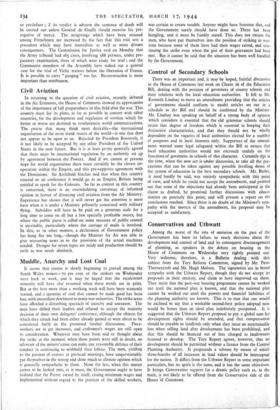Civil Aviation
In returning to the question of civil aviation, recently debated in the Air Estimates, the House of Commons showed its appreciation of the importance of full preparedness in this field after the war. This country must lay its plans, as far as possible in concert with other countries, for the development and regulation of services which for better or worse are destined to revolutionise world communications. The course that many think most desirable—the international organisation of the main trunk routes of the world—is one that does not appear to be open to us. Rejected by President Roosevelt, it is not likely to be accepted by any other President of the United States in the near future. But it is at least pretty generally agreed that there must be international regulation by an authority set up by agreement between the Powers. And if we cannot at present hope for world organisation there must certainly be the closest co- operation within the Empire, and this pre-supposes agreement with the Dominions. Sir Archibald Sinclair said that when this country entered an air conference it would go as an Empire, Britain being entitled to speak for the Colonies. So far as control in this country is concerned, there is an overwhelming consensus of informed opinion in favour of divorcing civil aviation from the Air Ministry. Experience has shown that it will never get the attention it must have when it is under a Ministry primarily concerned with military flying. Subsidies will have to be paid on a generous scale for a long time to come on all but a few specially profitable routes, but where the public purse is called on some measure of public control is inevitable, particularly where the carriage of mails is involved. In this, as in other matters, a declaration of Government policy has hung fire too long,—though the Minister for Air was able to give reassuring news as to the provision of the actual machines needed. Designs for seven types are ready and production should be swift as war needs diminish.


























 Previous page
Previous page